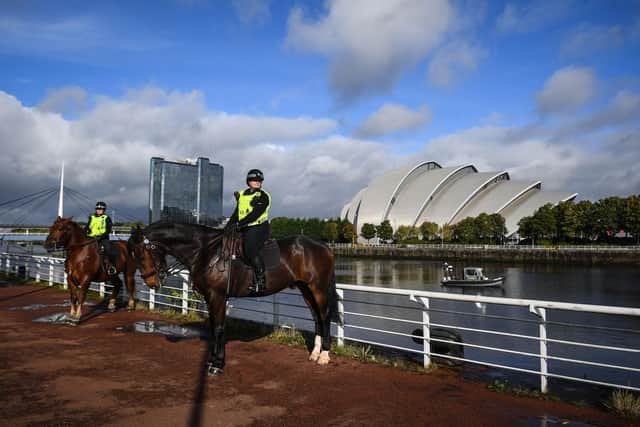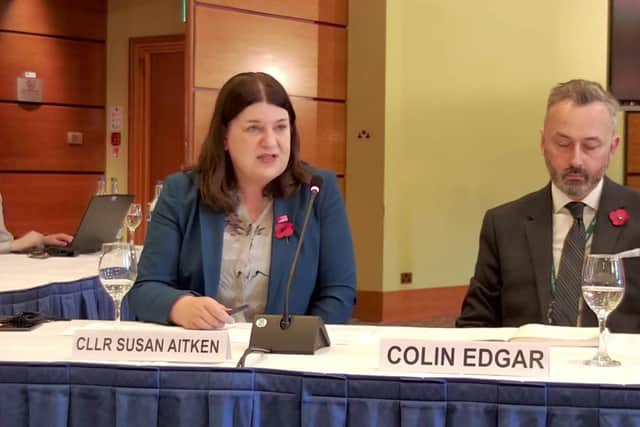COP26: Thousands of delegates yet to secure rooms with Glasgow summit facing 'accommodation crisis'
The Scottish Affairs Committee heard the UK Government’s official accommodation provider for the climate change summit has only secured around a third of the hotel rooms in the Greater Glasgow area, and had not done enough to “satisfy demand”.
The joint chair of the Greater Glasgow Hoteliers’ Association admitted there was not enough official accommodation for the event, which will see up to 30,000 delegates and more than 120 world leaders descend on the city.
Advertisement
Hide AdAdvertisement
Hide AdThose behind the COP26 homestay network, meanwhile, have so far unsuccessfully attempted to secure emergency accommodation in sports halls and community halls in the city, with around 3,000 people on their waiting list.
With less than a week to go before the summit begins, the problems surrounding accommodation poses a major headache for the UK Government, which is hosting the conference, particularly with planned strike action from transport unions set to disrupt those intent on travelling to Glasgow from further afield.
Only last month, the Climate Action Network, which represents around 1,500 climate civil society organisations, called for COP26 to be postponed due to the rising costs of accommodation and travel, as well as access to Covid-19 vaccines.
The group warned the gathering risked excluding government delegates, campaigners and journalists from Global South nations.
Appearing before the committee, Susan Aitken, the leader of Glasgow City Council, told MPs that all delegates had been able to secure accommodation ahead of the fortnight-long conference.


However, Dr Kat Jones, COP26 project manager at Stop Climate Chaos Scotland, a coalition of civil society organisations campaigning together on climate change, said that claim was “not true”, with many delegates left unable to find hotels due to the COP26 certification process.
“There are thousands of delegates who don’t have accommodation because often these badges are not given out until a few weeks beforehand, and most of the accommodation was booked in Glasgow months and months ago,” she said.
“A lot of these delegations that are coming from far afield have to wait until they have the number of badges to book accommodation and travel, and that’s only happening over the last couple of weeks.


Advertisement
Hide AdAdvertisement
Hide Ad“We’ve had contacts from many delegates … and even official delegations from countries, who are not finding accommodation. This is definitely an accommodation crisis we’ve got.”
Janice Fisher, joint chair of the Greater Glasgow Hoteliers’ Association, acknowledged there was not enough official accommodation within the campus.
She told the committee that MCI Group, a Swiss firm appointed by the UK Government as the official accommodation provider for COP26, had a mandate to secure 15,000 rooms on behalf of the United Nations.
But she said: “Within two miles of the exhibition centre, there are actually only 9,750 hotel rooms available. Within 20 miles that increases to 14,399.
“MCI only secured one third of that accommodation because they were asked to secure accommodation in other parts of the country as well to encourage a range of offers and pricing.”
She later added: “They would say themselves they did not secure enough to satisfy demand for what is required for the COP.”
Dr Jones said the COP26 homestay network, a grassroots initiative designed to bring people together and to encourage people in the Central Belt to host visitors, had been “absolutely swamped,” with over 1,000 people signed up.
“The problem is that’s not enough to meet the demand,” she said. “There is infinite demand.”
Advertisement
Hide AdAdvertisement
Hide AdThe SNP’s Mhairi Black cited The Scotsman’s story, which detailed the exorbitant costs faced by delegates travelling to Glasgow.
The Scotsman revealed in March how some delegates were being asked to pay £12,000 to stay in a small windowless hotel room via a booking with MCI.
Ms Black asked whether the homestay network had become a “sticking plaster” to tackle accommodation issues.
Dr Jones replied: “We have had huge interest in it. We’ve got a waiting list of around 3,000 people who haven’t yet found accommodation.
“We needed to keep places for indigenous groups and global south delegations who do not book through the official channels because they can’t afford it.
“You can’t book on the hope you’re going to get ten badges, and you only get three, and you’re travelling from the Pacific Islands. These people book a month in advance.”
Dr Jones also revealed the homestay network had even been approached by one ministerial delegation unable to find somewhere to stay, with organisers directing them to the UK Government to secure rooms.
Earlier, Ms Aitken said Glasgow was “ready, with caveats,” in the run up to the event, explaining: “The caveats are mainly technical. Some of them have already been resolved. None of them were massive or enough to cause panic.”
Advertisement
Hide AdAdvertisement
Hide AdBut the committee heard a fraught exchange between Ms Aitken and Douglas Ross, the leader of the Scottish Conservatives, over the cleanliness of Glasgow.
“Is it technical issues that the bins are overflowing, there’s rats on the streets, and some of your employees have been taken to hospital while collecting rubbish?” Mr Ross asked.
“No, and again I would say that’s completely gratuitous, and …,” she replied, before Mr Ross cut in.
“Sorry, that is happening though, isn’t it?”
“No,” Ms Aitken answered.
“So your employees haven’t been taken to hospital, there are no bins overflowing, there are no rats?” Mr Ross asked.
Ms Aitken went on: “There have been one, possibly two at most, small health and safety incidents where an employee was taken to hospital as a precaution for what was very minor contact with a rat.
“I have to say, it’s not unheard of, and it hasn’t been unheard of for decades, that our cleansing employees occasionally experience rats. It’s also not something that’s unique to Glasgow. It’s happening right across the UK. All cities have rats.”
A message from the editor:
Thank you for reading this article. We're more reliant on your support than ever as the shift in consumer habits brought about by coronavirus impacts our advertisers. If you haven't already, please consider supporting our trusted, fact-checked journalism by taking out a digital subscription.
Comments
Want to join the conversation? Please or to comment on this article.
